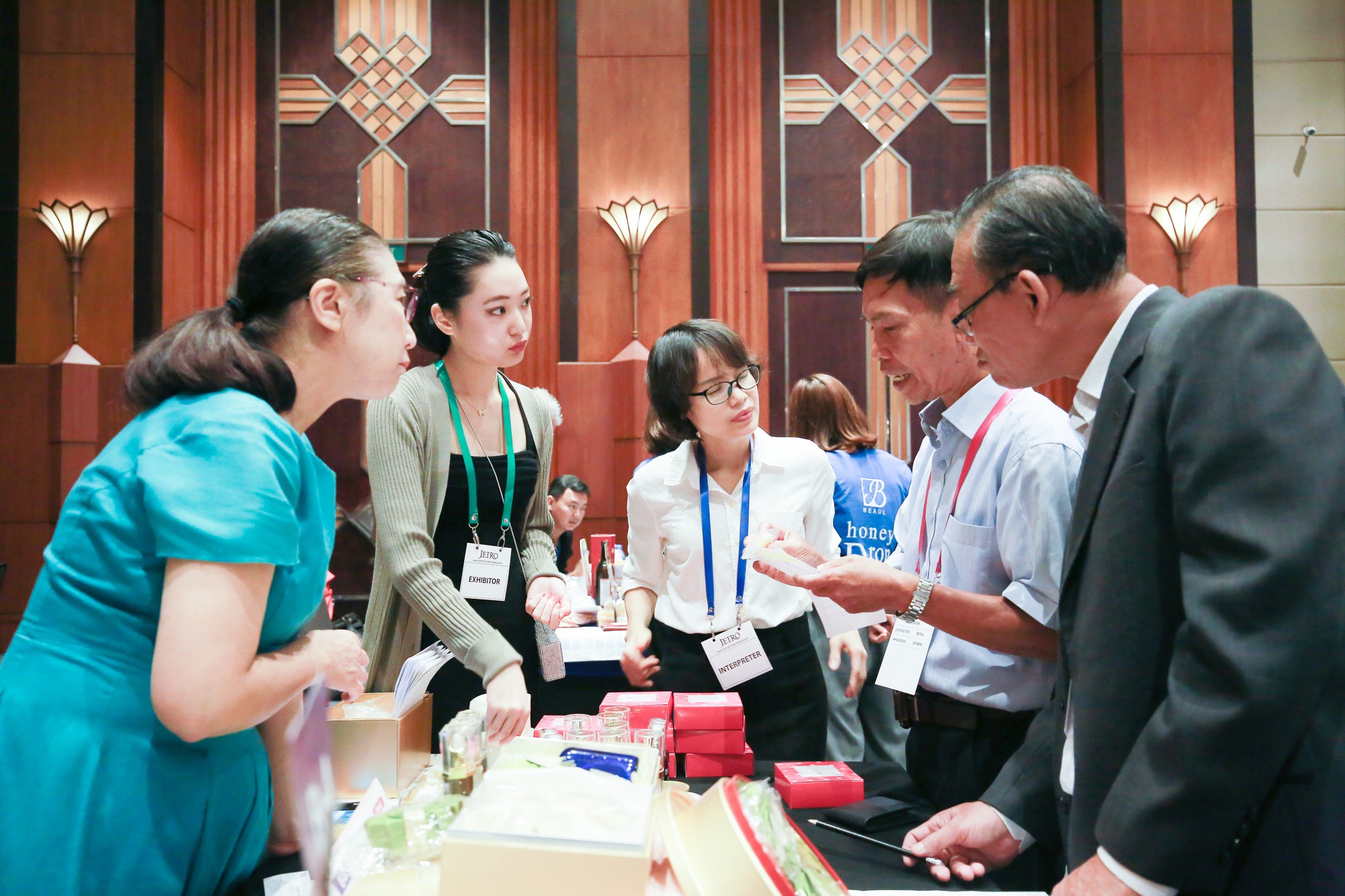Over a hundred exchanges between Vietnamese and Japanese enterprises occurred in an event called ‘Connect Japanese Consumer Goods Producers – Good Goods Japan 2018,’ held in Ho Chi Minh City and Hanoi last week by the Japan External Trade Organization (JETRO).
Japanese manufacturers of consumer products and household appliances here wished to expand their operations in the Vietnamese market after realizing the country’s growing potential.
Around 10:00 am on December 7 at the hotel Meliá Hanoi, Tomofumi Abe, JETRO’s representative in Hanoi, was discreetly telling those engaged in the exchanges to make their conversations as brief and effective as possible so that Japanese firm representatives could find the most potential corporate customers.
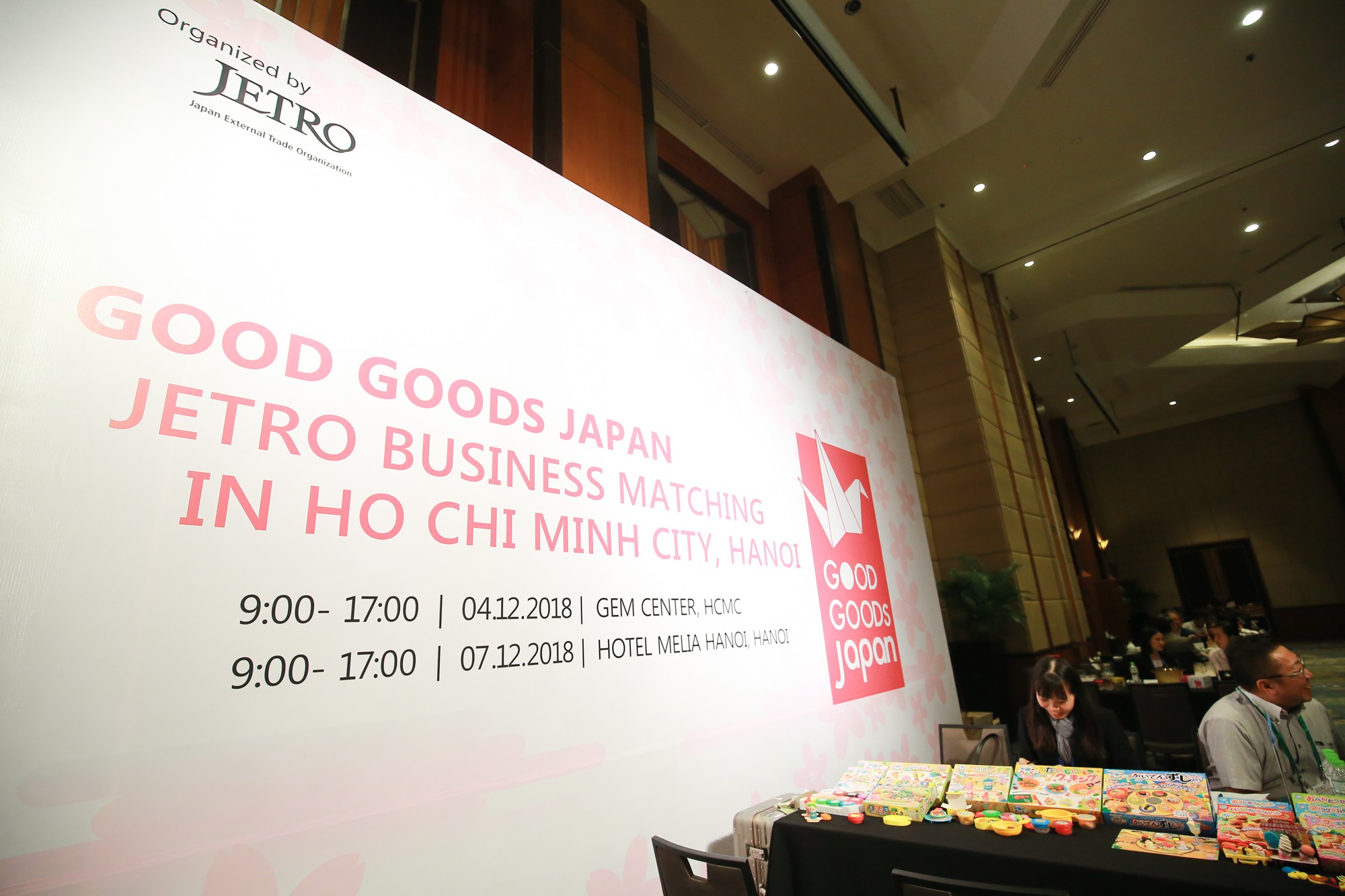 |
| A banner for ‘Good Goods Japan’ is seen in Hanoi, Vietnam. Photo: Tuoi Tre |
Having waited patiently for his turn to talk with foreign attendees, Tran Duc Hung – director of Awa Joint Stock Company – said the firm has spent 20 years cooperating with Japanese partners in selling household appliances and importing materials used for making seals.
Japanese goods fetch high prices but are more effective, durable and environmentally friendly because they use natural and organic materials while following strict standards on toxic substances.
Hung said as Vietnamese people have increasingly preferred high-quality products, his company wants to seek more cosmetics and consumer goods providers and add them to its distribution system.
“Japanese partners worked very carefully and made really transparent and serious transactions,” Hung said.
“Whenever we needed any assistance in how to improve materials and designs, they helped us with great enthusiasm.
“I hope to find businesses that can directly provide us with health and beauty care products so that we can obviate the need for intermediaries and lower our selling price.”
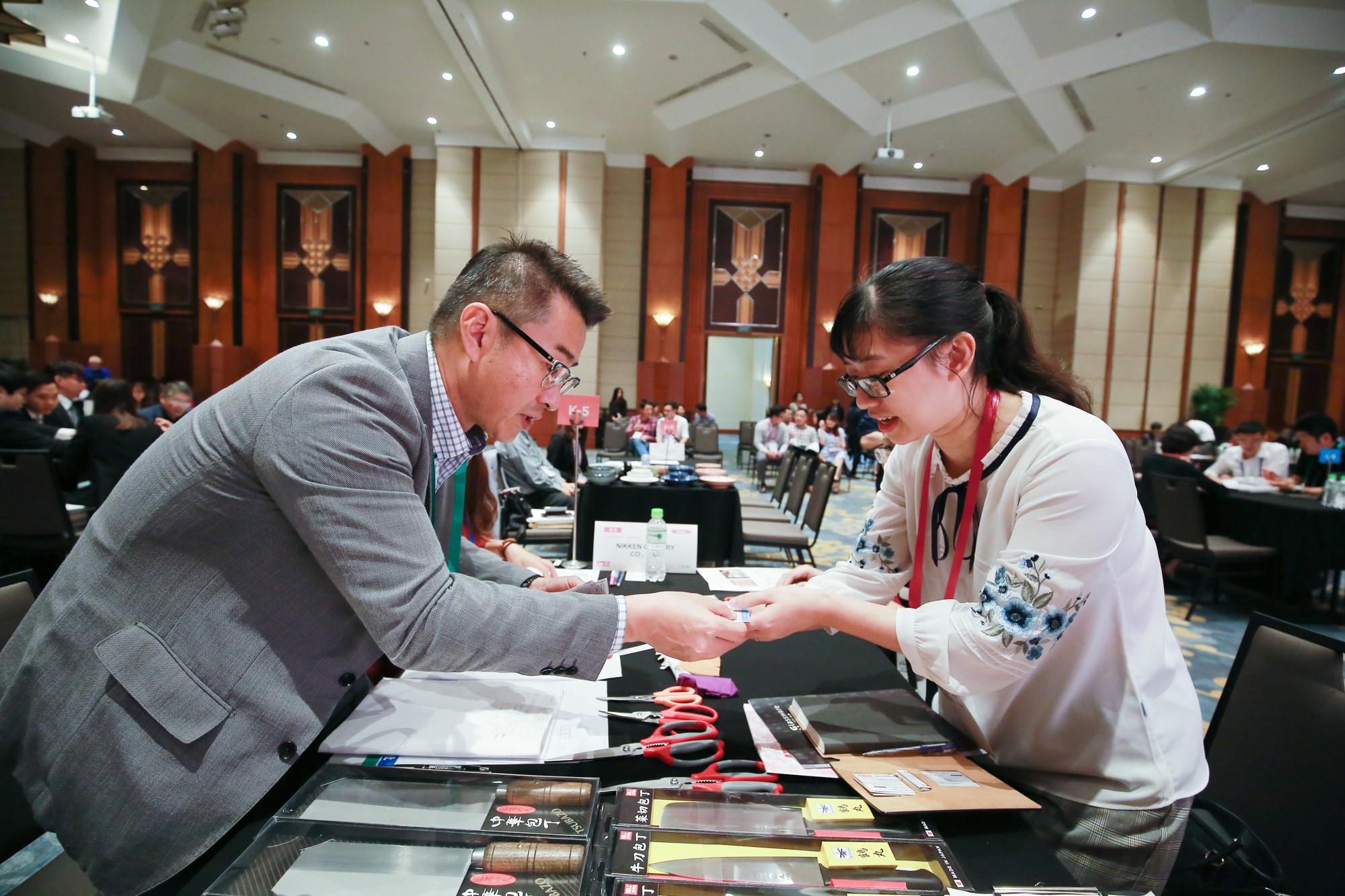 |
| Japanese and Vietnamese firms discuss cooperation opportunities at the event ‘Good Goods Japan’ in Hanoi, Vietnam, December 7, 2018. Photo: Tuoi Tre |
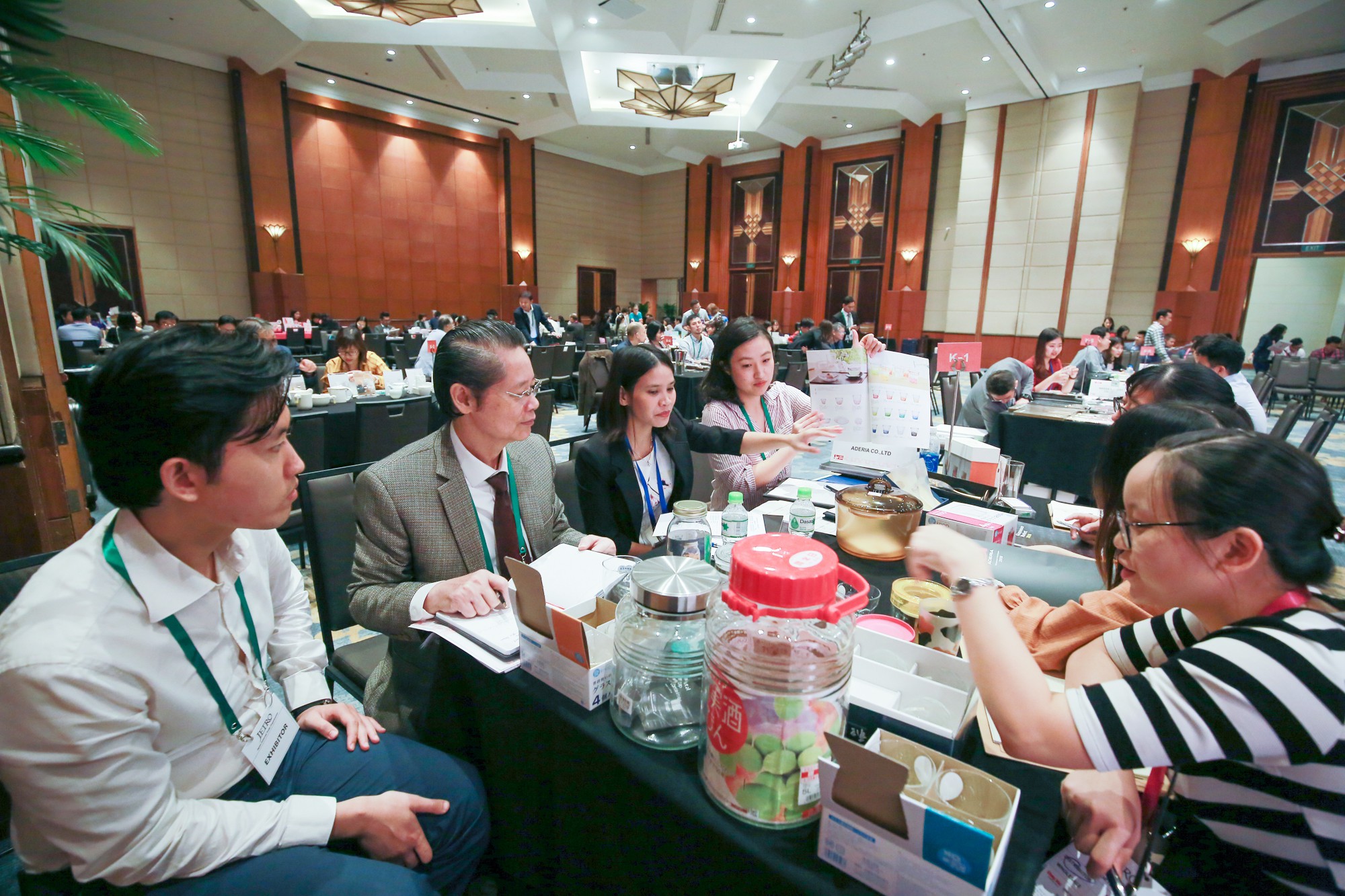 |
| Japanese and Vietnamese firms discuss cooperation opportunities at the event ‘Good Goods Japan’ in Hanoi, Vietnam, December 7, 2018. Photo: Tuoi Tre |
Nguyen Tien Phan, CEO of Viko Hair Co. Ltd, a Hanoi-based company producing multifunctional Viko scissors, said demand for goods from Japan is on the rise as they are praised by Vietnamese users for their quality, durability and convenience.
But their prices are a disincentive, given the fact that they cost 20-30 percent higher than domestic products do, Phan said.
“We’re discussing with various suppliers to select the companies which can provide diverse goods at competitive prices and already have policies in helping importers like us,” Phan said.
Vietnamese enterprises regard the above exchanges as an opportunity for them to meet as many Japanese suppliers as possible before deciding on the most suitable candidates for partnership.
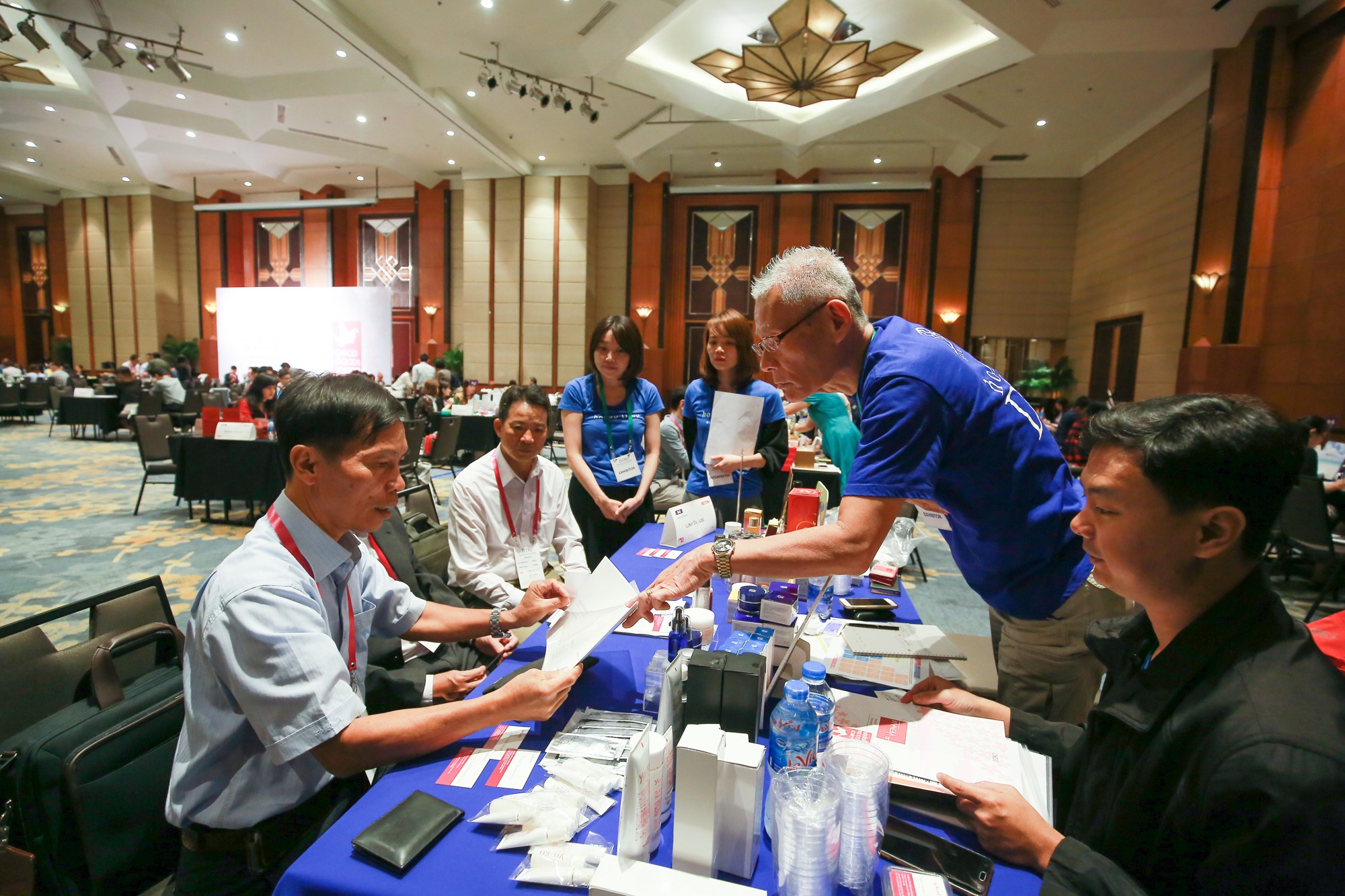 |
| Japanese and Vietnamese firms discuss cooperation opportunities at the event ‘Good Goods Japan’ in Hanoi, Vietnam, December 7, 2018. Photo: Tuoi Tre |
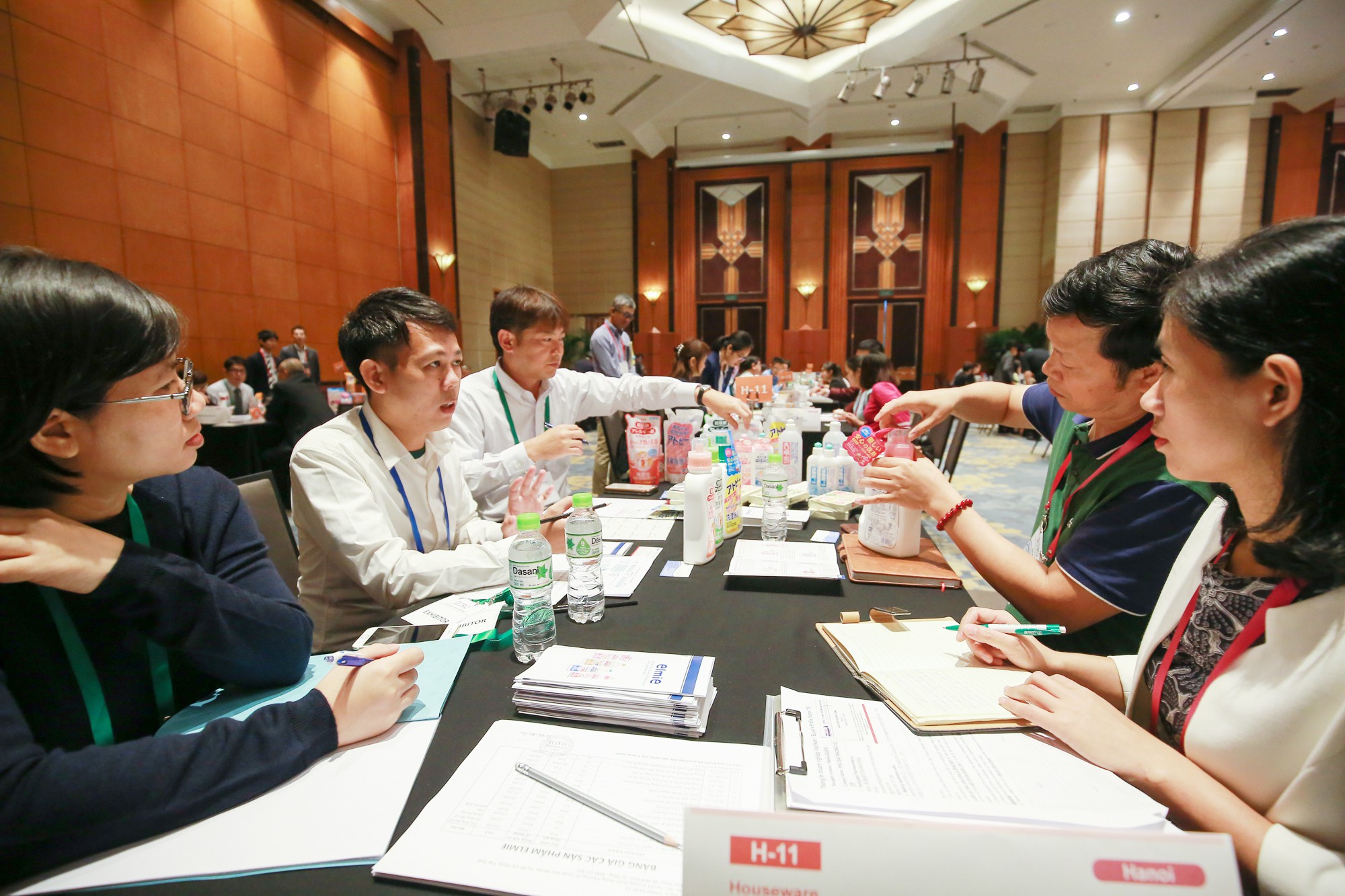 |
| Japanese and Vietnamese firms discuss cooperation opportunities at the event ‘Good Goods Japan’ in Hanoi, Vietnam, December 7, 2018. Photo: Tuoi Tre |
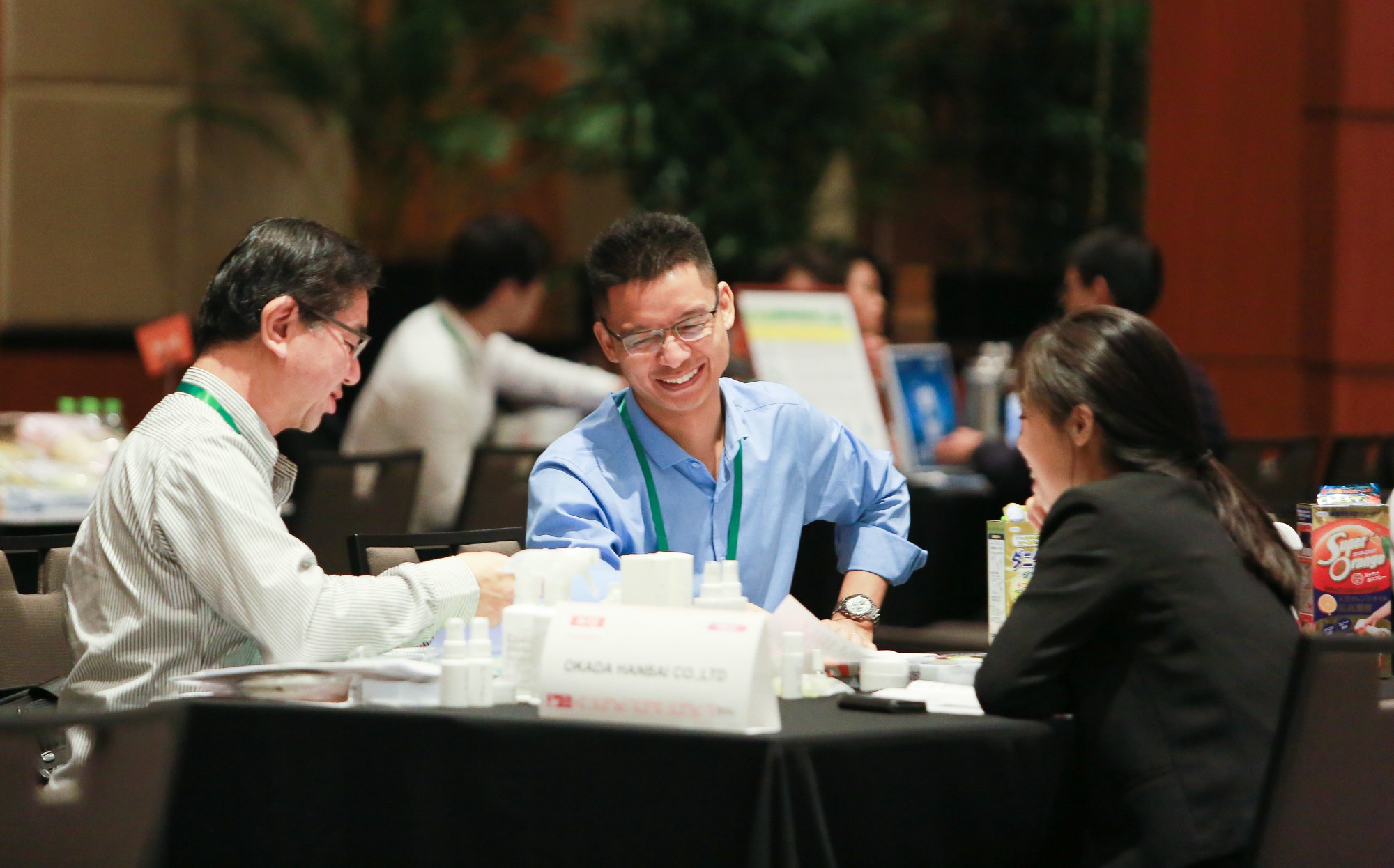 |
| Japanese and Vietnamese firms discuss cooperation opportunities at the event ‘Good Goods Japan’ in Hanoi, Vietnam, December 7, 2018. Photo: Tuoi Tre |
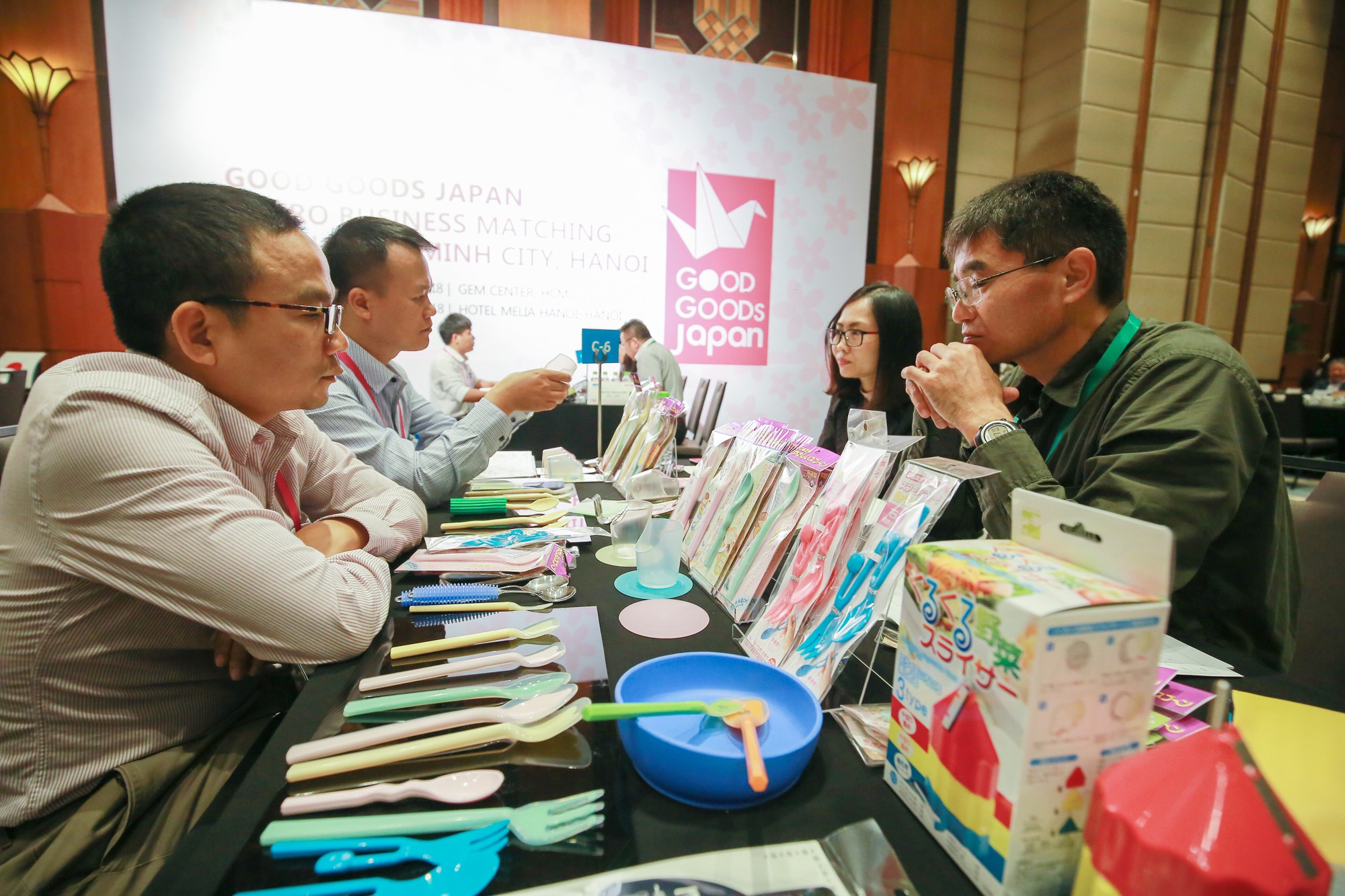 |
| Japanese and Vietnamese firms discuss cooperation opportunities at the event ‘Good Goods Japan’ in Hanoi, Vietnam, December 7, 2018. Photo: Tuoi Tre |
A similar event for corporate talks took place on December 4, drawing the participation of 50 companies from Japan and around 100 Vietnamese businesses.
Three years since it was first organized in Ho Chi Minh City, the ‘Connect Japanese Consumer Goods Producers – Good Goods Japan 2018’ day returned to the southern metropolis.
This happened when the Japanese government had recognized a chance to boost the penetration of its products into the Vietnamese market, which is seeing a booming demand.
High-quality Japanese goods overwhelm sellers
Ayumi Kusaba, JETRO’s vice-director proffering counsel on small and medium businesses, the number of Japanese firms joining the ‘Good Goods Japan 2018’ events in Vietnam was far greater than the count in the same events it held in Thailand, Malaysia, and China.
The JETRO representative said a new feature of the events in Vietnam was that Japanese companies brought here high-standard items of great usefulness.
They ranged from notebooks with high-quality paper, child-teaching products created by RYM Co. Ltd, kitchen utensils such as knives, forks, and plates, to cosmetics and dietary supplements made on the basis of scientific research.
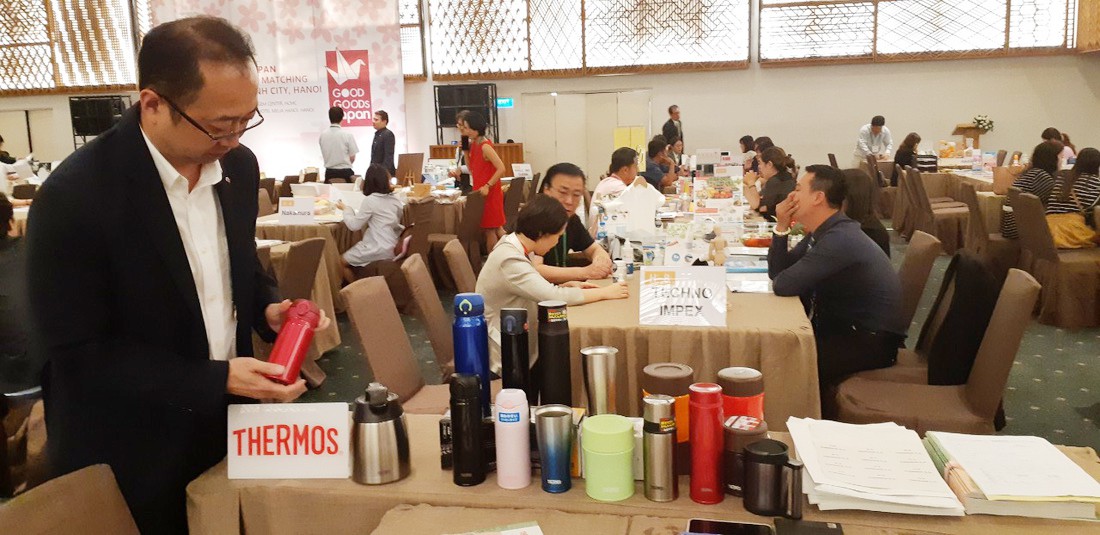 |
| Japanese and Vietnamese firms discuss cooperation opportunities at the event ‘Good Goods Japan’ in Ho Chi Minh City, Vietnam, December 4, 2018. Photo: Tuoi Tre |
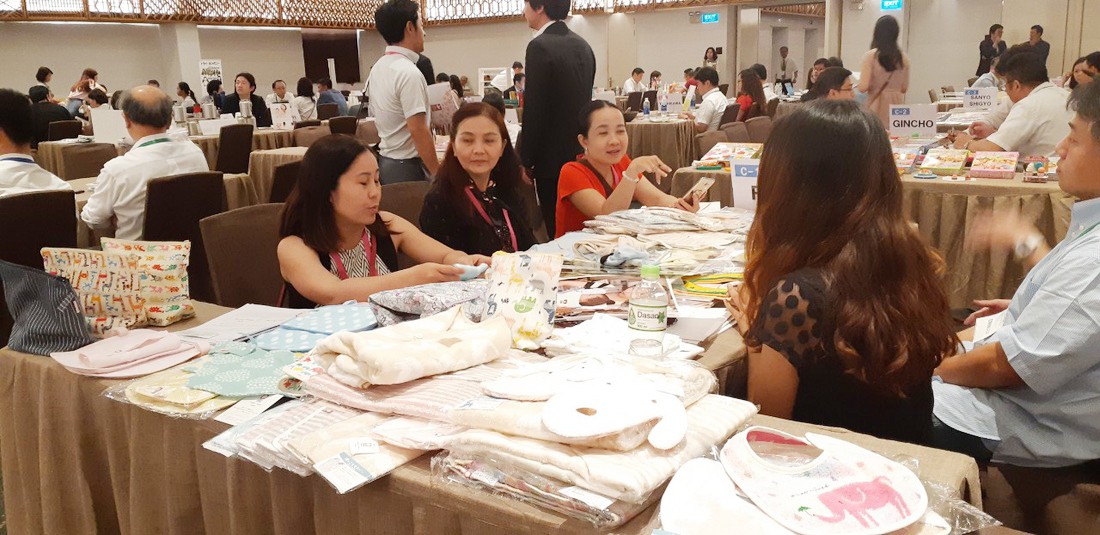 |
| Japanese and Vietnamese firms discuss cooperation opportunities at the event ‘Good Goods Japan’ in Ho Chi Minh City, Vietnam, December 4, 2018. Photo: Tuoi Tre |
Yoichiro Takagi, representative of the Honmono Company, said the firm focuses on creating goods using environment- and earth-friendly technology.
“We already have dietary supplement outlets in shopping centers in Ho Chi Minh City, but we want to develop a retail system rooted in drugstores,” he said.
Another Japanese business, Gincho Industry, introduced at the events toys that can bring smiles to children.
Its representative said the products, made from rice flour, salt and water, all meet Japan Toy Safety Standard ST and passed examinations by STC – a global independent third-party testing laboratory that has been recognized by Japan.
“If children happen to eat them, that isn’t harmful because the toys are made completely from natural ingredients,” the representative said.
“We now have a franchised distributor of our toys in Vietnam. The sales have been modest but orders remain stable in numbers.
“Despite their high prices, they can compete pretty well with many products of the same type in the country.
“We hope to attract more Vietnamese buyers after we’ve put into place the policy of assisting our partners in promoting products in online environments such as Facebook.”
Hiromi Sawafuchi – who has been in charge of market development strategies at high-quality notebook manufacturer Sanyoshiyo – said he had discussed partnerships with major Vietnamese bookstores.
The firm’s notebooks cost from VND600,000 (US$26) to over VND1,000,000 ($43) apiece and its intended users include doctors, engineers and artists.
Busy talking with Vietnamese businesses, Susumu Hayasaki, who represented high-standard cloth maker Nissen Shoko, said the company had entered the Vietnamese market and its next targeted demographics are women and children.
Bridging price gap
Japanese enterprises have sold products diverse in type and design in Vietnam, with the items ranging from children’s toys, kitchen tools, and household appliances to cosmetics, stationery and office supplies.
They have the advantage of offering goods of excellent quality but the products are rather expensive, usually 20-30 percent higher than the average prices for products of the same type.
But they are capturing the attention of many Vietnamese importers and distributors thanks to their quality.
Kusaba, the JETRO counselor, said conducting surveys at retailers across Ho Chi Minh City and Hanoi may help Japanese businesses pitch their selling prices at a more reasonable level.
Abe, the JETRO representative in Hanoi, believed that as the Southeast Asian country has a great economic growth rate and larger proportions of high-incomers, it is a promising market.
Demand for high-quality goods, therefore, should be the top priority in considering consumption, he concluded.
This was proved by the fact that over 200 Vietnamese joined the ‘Good Goods Japan 2018’ event in Hanoi alone, he underlined.
Abe suggested that in order for dialogues for business cooperation to be effective, JETRO should propose a theme for each event so that Japanese companies can have more chances to enter the Vietnamese market.
“Corporate connection programs like this lay the groundwork for Japanese goods’ easier penetration into the Vietnamese market,” he said.
“Business agreements of large transaction value were signed after five such programs were organized in the past years.
“Japanese products would doubtless compete better in the Vietnamese market than goods from other countries as they come with high quality and earn trust from buyers.”
Like us on Facebook or follow us on Twitter to get the latest news about Vietnam!



